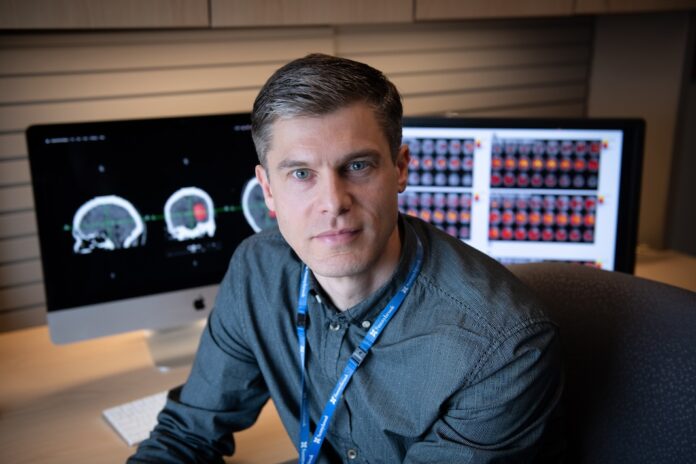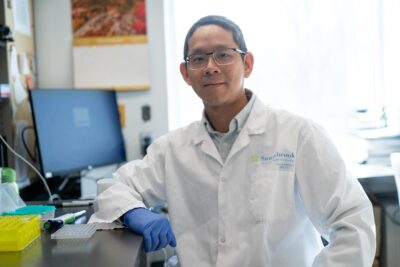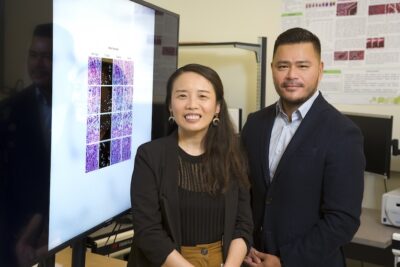
Advancements in technology play a crucial role in health care breakthroughs and holds significant potential for the future. Researchers at Sunnybrook are using emerging artificial intelligence (AI) technologies to advance the diagnosis, treatments and outcomes of some of the world’s most debilitating diseases.
Improving screening for oral cancer
Oral cancer is a form of head and neck cancer, affecting more than 5,000 Canadians per year. Progression of the disease can drastically affect the way an individual eats and speaks. Dr. Jesse Chao, scientist in the Odette Cancer Research Program at Sunnybrook Research Institute (SRI) and Canada Research Chair in Precision Cancer Diagnostics and Artificial Intelligence, is developing new AI software to better detect cancerous cells in the mouth and lymph nodes which will support early detection, staging, and prognosis, leading to improved patient outcomes.

Using samples from over 500 patients with oral cancer, Dr. Chao and his team are training AI software to automate the image analysis of microscopy data. The software first identifies regions in the tissue and pinpoints areas likely to contain tumours, it then confirms the presence of cancerous cells. Pathologists often have to go through numerous slides and use many different dyes and stains to determine an oral cancer diagnosis. “Automating this process enhances diagnostic quality, advances early detection, supports personalized treatments and ultimately improves patient outcomes,” explains Dr. Chao.
Currently Dr. Chao and his lab are applying this model to detect instances of oral cancer, however, with further research Dr. Chao hopes the software will play a role in the diagnosis of other forms of cancer too.
Locating brain bleeds faster
An intracerebral hemorrhage (ICH), or brain bleed, is a form of stroke and occurs by a spontaneous artery rupture or traumatic brain injury. ICH is the deadliest types of stroke, accounting for one in six acute strokes. Dr. Bradley MacIntosh, senior scientist in the Hurvitz Brain Sciences Research Program, and his lab are using deep-learning AI tools to support acute stroke imaging and aid in the treatment of patients suffering the deadliest types of stroke.
Timely diagnosis and treatment play a critical role in stroke patient outcomes and in order to provide care for patients suffering from a brain bleed, clinicians need to know the size of the bleed and where it is located. The MacIntosh lab has built an AI tool called VIOLA to analyze, detect, and outline locations of hemorrhages visible on computed tomography (CT) scans of patients who have had a stroke. The VIOLA tool searches CT scans and automates these measurements, saving time and potentially improving patient outcomes.
“The VIOLA tool can provide clinicians with an accurate analysis and measurement of a brain bleed, enabling faster care and ultimately increasing the likelihood of recovery for stroke patients,” says Dr. MacIntosh.

Supporting precision radiation oncology
Breast cancer is one of the most common types of cancer affecting women in Canada, with about 1 in 8 women developing it in their lifetime. Dr. William Tran, radiotherapist and senior scientist in the Odette Cancer Program and Dr. Fang-I Lu, a breast pathologist at Sunnybrook, have teamed up to develop an AI tool to improve radiation therapy treatment for breast cancer patients.
The team’s technology maps the tumour immune microenvironment, the complex ecosystem of cells surrounding the breast’s tumour, to measure the probability of a tumour’s response to high-dose radiation treatment in women with high-risk breast cancer. The project involves taking thousands of tumour images and complex computational methods to recognize biomarkers associated with the tumour-killing effects of radiation treatment. Dr. Lu explains, “the ability to predict a tumour’s response to certain types of therapy has the potential to support more personalized and effective treatment plans for patients with advanced breast cancer.”
Radiation therapy is a common type of treatment for many cancers, but can also damage healthy cells in the body. “Our AI-based prediction model will help spare patients who are unlikely to benefit from radiation treatment from the short and long-term side effects associated with exposure to that type of therapy,” adds Dr. Tran.
By Anna McClellan
Anna McClellan is a Communications Specialist at Sunnybrook Health Sciences Centre.

